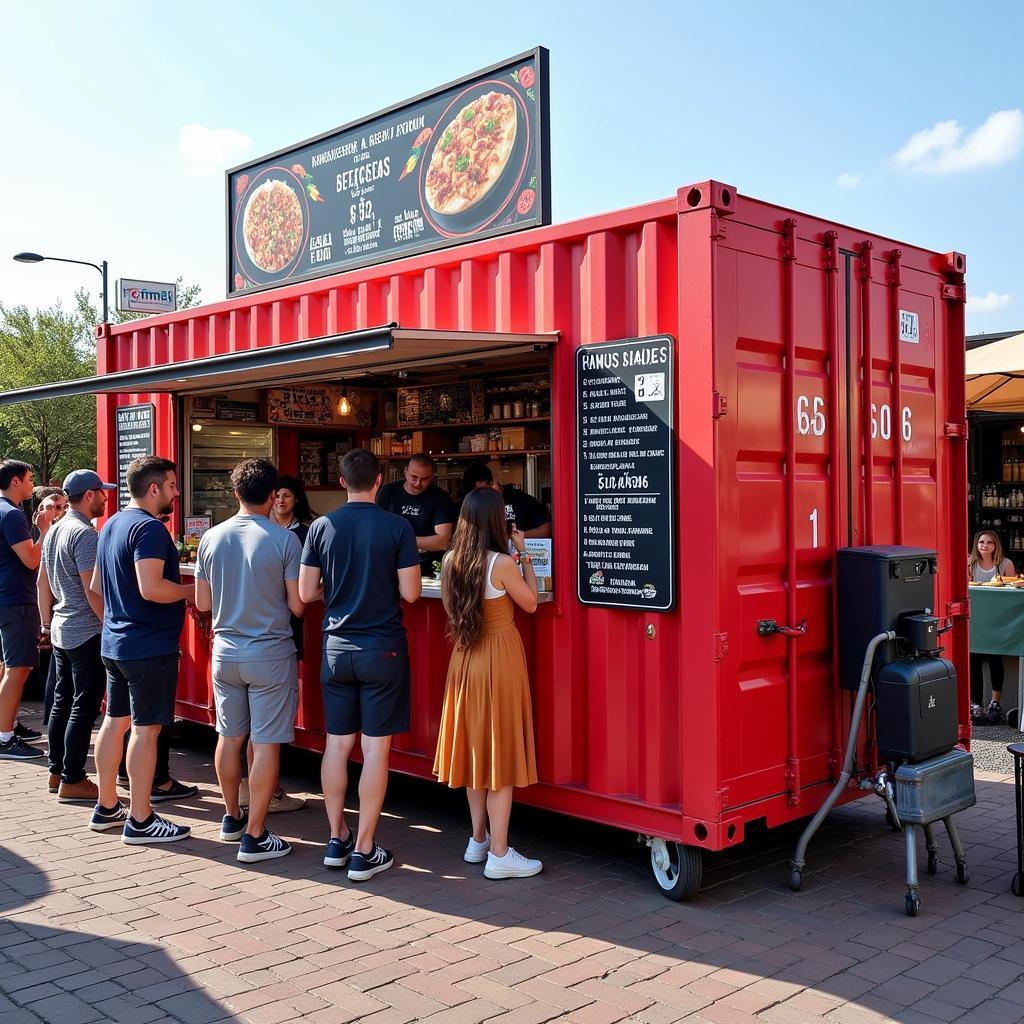Shipping Container Food Trucks are revolutionizing the food industry, offering a unique blend of mobility, affordability, and style. They’ve become a popular choice for entrepreneurs looking to launch their culinary dreams, offering a more cost-effective and customizable alternative to traditional food trucks. From bustling city streets to vibrant festivals, these converted steel boxes are serving up everything from gourmet burgers to exotic fusion cuisine. Let’s dive into the exciting world of shipping container food trucks.
 A vibrant red shipping container food truck parked at a bustling street food market, serving customers.
A vibrant red shipping container food truck parked at a bustling street food market, serving customers.
Why Choose a Shipping Container Food Truck?
There are several compelling reasons why aspiring food entrepreneurs are increasingly opting for shipping container food trucks.
- Cost-Effectiveness: Compared to building a traditional food truck from scratch, converting a shipping container can be significantly more affordable. Used shipping containers are readily available at competitive prices, providing a solid foundation for your mobile kitchen. You can save on cardboard food boxes when buying in bulk.
- Customization: Shipping containers offer a blank canvas for your creative vision. You can easily modify the layout, install windows and doors, and add personalized design elements to create a unique and eye-catching food truck.
- Durability and Security: Built to withstand harsh weather conditions and long sea voyages, shipping containers are inherently robust and secure. They provide excellent protection for your equipment and offer peace of mind when it comes to theft and vandalism.
Designing Your Shipping Container Food Truck
Designing your shipping container food truck requires careful planning and consideration of your specific needs.
Key Design Considerations
Here are some essential factors to keep in mind:
- Kitchen Layout: Optimize your workflow by strategically positioning your cooking equipment, prep areas, and storage space. Consider the type of cuisine you’ll be serving and the volume of customers you anticipate.
- Ventilation: Proper ventilation is crucial for maintaining a comfortable and safe working environment. Ensure adequate airflow to remove smoke, heat, and cooking odors.
- Plumbing and Electrical Systems: Plan your plumbing and electrical systems carefully to accommodate your equipment and ensure compliance with local regulations.
“A well-designed shipping container food truck is a testament to efficiency and functionality,” says renowned food truck consultant, Amelia Rodriguez. “Every inch of space should be utilized strategically to create a seamless and productive work environment.”
Getting Your Shipping Container Food Truck on the Road
Once your food truck is built, you’ll need to take care of the necessary permits and licenses to operate legally.
Permits and Licenses
The specific requirements vary depending on your location, so it’s crucial to research local regulations. Generally, you’ll need permits for:
- Food Service: This permit ensures that your food handling practices meet health and safety standards. You can look into food packaging supplies near me for your business.
- Business Operation: This permit allows you to legally operate your business within your city or county.
- Mobile Food Vendor: This permit specifically authorizes you to operate a mobile food business.
“Navigating the permit and licensing process can seem daunting,” advises experienced food truck owner, David Chen. “However, taking the time to understand and comply with local regulations is essential for long-term success.” Consider getting wholesale food boxes if you are looking to offer deals and packages for your food truck business.
Conclusion
Shipping container food trucks offer a compelling and innovative approach to entering the culinary world. By combining affordability, customization, and durability, they provide a solid foundation for aspiring food entrepreneurs to launch and grow their businesses. Remember to carefully plan your design, secure the necessary permits, and let your culinary creativity shine.
FAQ
Situations with frequently asked questions.
Q: What are the insulation requirements for a shipping container food truck?
A: Insulation is crucial for maintaining a comfortable temperature inside your food truck, especially during hot summers and cold winters. Consult with a professional to determine the appropriate insulation materials and methods for your specific climate and needs. For packaging needs, you can get wholesale food packaging boxes.
Q: How do I handle waste disposal in a shipping container food truck?
A: Proper waste disposal is essential for maintaining hygiene and complying with regulations. Install appropriate waste bins and establish a system for collecting and disposing of both solid and liquid waste.
Other questions you might want to consider:
- How can I market my shipping container food truck effectively?
- What are the best practices for food safety in a mobile kitchen?
- How do I choose the right location for my food truck business?
For more information, you can read our article on horse food delivery.
Need help? Please contact us by Phone: 02437655121, Email: minacones@gmail.com or visit our address: 3PGH+8R9, ĐT70A, thôn Trung, Bắc Từ Liêm, Hà Nội, Việt Nam. We have a 24/7 customer service team.